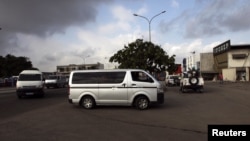Liberia's foreign minister says his country will take every measure to ensure there is peace in neighboring Ivory Coast, after Liberia closed its border between the two nations.
The closing followed Friday's killing of seven United Nations peacekeepers and eight civilians in the Ivory Coast town of Tai. Ivorian officials said Liberia-based gunmen carried out the attack, while the U.N. says it is still not clear who was responsible.
Liberian Foreign Minister Augustin Ngafuan said officials from both countries will meet to discuss the situation this week. He said Liberia has an excellent relationship with Ivory Coast, and that having a peaceful, stable neighbor is good for the region.
"We will not allow any inch of Liberia's territory to be used to destabilize any of our neighbors. Liberia had a difficult decade or so and we do not want a reversal of the gains we've scored within the sub-region. So we do not look at whatever happens in Cote d'Ivoire to be an Ivorian problem, it is a collective problem of the sub-region," said Ngafuan.
In addition to closing its side of the border, Liberia has sent troops and police to protect the area, suspended mining activities in the region and is considering relocating refugee camps further inside its territory.
U.N. peacekeeping chief Herve Ladsous on Monday briefed the U.N. Security Council on the killings. He will travel to Ivory Coast this week for a memorial service.
Before last week's shootings, Human Rights Watch had reported that mercenaries and militias based in eastern Liberia were carrying out cross-border raids and recruiting child soldiers. HRW accused Liberia of failing to hold the gunmen accountable.
The rights group said the attackers include Liberian mercenaries and Ivorian militiamen who fought for Ivory Coast's former president Laurent Gbagbo.
Ngafuan rejected the criticism, and says that Liberia has been working closely with its neighbors on the issue, including an agreement last month to extradite any mercenaries it had arrested.
Gbagbo lost a 2010 presidential election to President Alassane Ouattara but fought to remain in power. About 3,000 people were killed in a bloody power struggle between the two sides, until the former president was captured in April of last year. He has been charged with crimes against humanity and is being held in The Hague by the International Criminal Court.
The closing followed Friday's killing of seven United Nations peacekeepers and eight civilians in the Ivory Coast town of Tai. Ivorian officials said Liberia-based gunmen carried out the attack, while the U.N. says it is still not clear who was responsible.
Liberian Foreign Minister Augustin Ngafuan said officials from both countries will meet to discuss the situation this week. He said Liberia has an excellent relationship with Ivory Coast, and that having a peaceful, stable neighbor is good for the region.
"We will not allow any inch of Liberia's territory to be used to destabilize any of our neighbors. Liberia had a difficult decade or so and we do not want a reversal of the gains we've scored within the sub-region. So we do not look at whatever happens in Cote d'Ivoire to be an Ivorian problem, it is a collective problem of the sub-region," said Ngafuan.
In addition to closing its side of the border, Liberia has sent troops and police to protect the area, suspended mining activities in the region and is considering relocating refugee camps further inside its territory.
U.N. peacekeeping chief Herve Ladsous on Monday briefed the U.N. Security Council on the killings. He will travel to Ivory Coast this week for a memorial service.
Before last week's shootings, Human Rights Watch had reported that mercenaries and militias based in eastern Liberia were carrying out cross-border raids and recruiting child soldiers. HRW accused Liberia of failing to hold the gunmen accountable.
The rights group said the attackers include Liberian mercenaries and Ivorian militiamen who fought for Ivory Coast's former president Laurent Gbagbo.
Ngafuan rejected the criticism, and says that Liberia has been working closely with its neighbors on the issue, including an agreement last month to extradite any mercenaries it had arrested.
Gbagbo lost a 2010 presidential election to President Alassane Ouattara but fought to remain in power. About 3,000 people were killed in a bloody power struggle between the two sides, until the former president was captured in April of last year. He has been charged with crimes against humanity and is being held in The Hague by the International Criminal Court.





